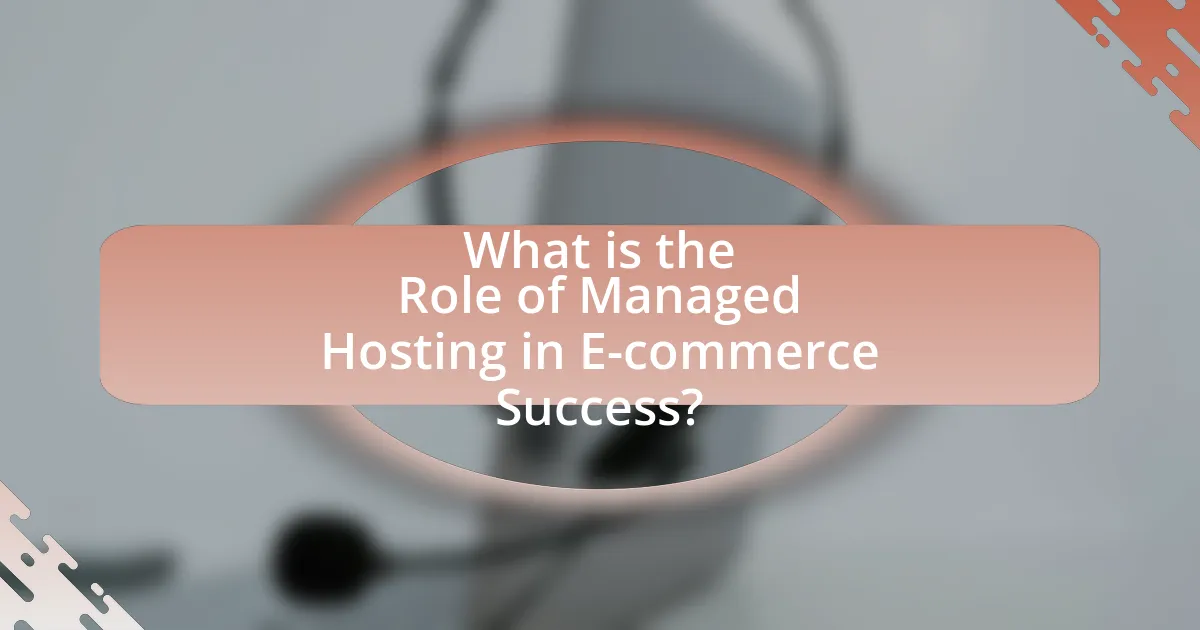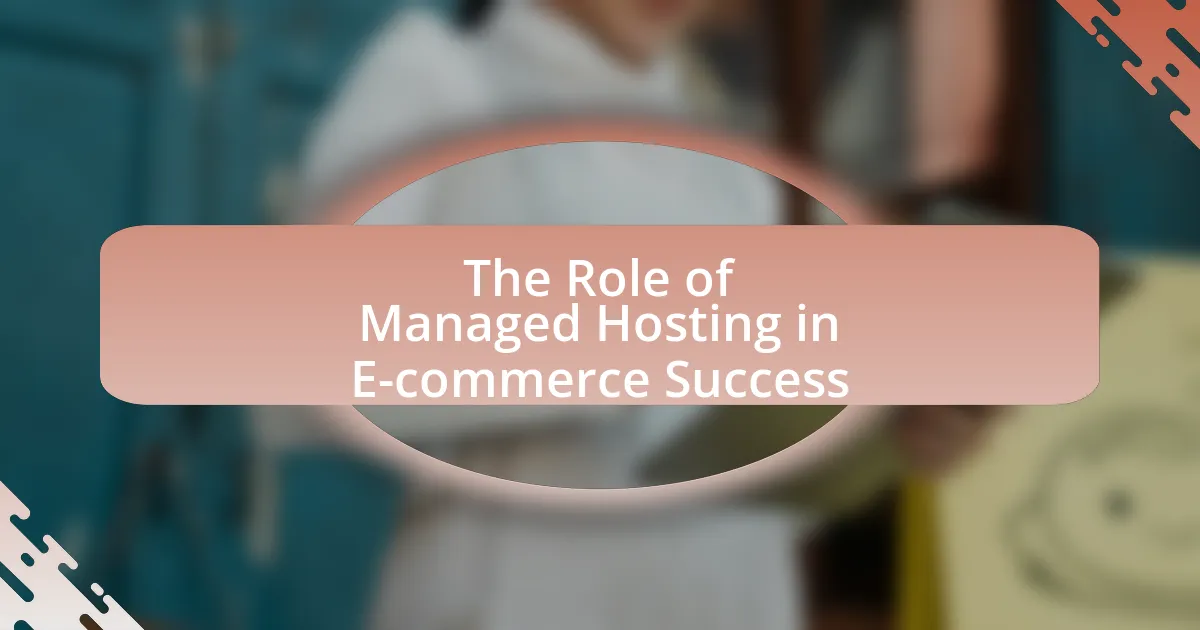Managed hosting is a vital component for achieving success in e-commerce, offering businesses reliable, secure, and scalable server solutions tailored to their needs. This article explores how managed hosting enhances website performance, security, and scalability, which are crucial for maintaining customer trust and maximizing sales. Key features such as dedicated resources, expert technical support, and compliance with industry regulations are discussed, alongside the risks e-commerce businesses face without managed hosting. Additionally, the article outlines various types of managed hosting solutions, best practices for optimization, and factors to consider when selecting a provider, emphasizing the importance of customer support in ensuring operational efficiency.

What is the Role of Managed Hosting in E-commerce Success?
Managed hosting plays a critical role in e-commerce success by providing businesses with reliable, secure, and scalable server solutions tailored to their specific needs. This type of hosting ensures high uptime, which is essential for maintaining customer trust and maximizing sales opportunities; for instance, a study by the Aberdeen Group found that a 1-second delay in page load time can lead to a 7% reduction in conversions. Additionally, managed hosting services often include enhanced security features, such as DDoS protection and regular backups, which safeguard sensitive customer data and comply with regulations like GDPR. Furthermore, the scalability offered by managed hosting allows e-commerce businesses to efficiently handle traffic spikes during peak shopping seasons, ensuring a seamless shopping experience for customers.
How does managed hosting support e-commerce platforms?
Managed hosting supports e-commerce platforms by providing dedicated resources, enhanced security, and expert technical support tailored to the specific needs of online businesses. This type of hosting ensures that e-commerce sites can handle high traffic volumes, maintain fast loading times, and offer a seamless user experience, which is crucial for conversion rates. Additionally, managed hosting services often include features such as automatic backups, software updates, and compliance with industry regulations, which further protect sensitive customer data and ensure operational continuity. According to a study by Statista, 79% of online shoppers who experience a slow-loading website are less likely to return, highlighting the importance of reliable hosting in e-commerce success.
What are the key features of managed hosting that benefit e-commerce?
Managed hosting offers several key features that significantly benefit e-commerce, including enhanced security, scalability, and dedicated support. Enhanced security measures, such as firewalls and regular security audits, protect sensitive customer data, which is crucial for maintaining trust and compliance with regulations like GDPR. Scalability allows e-commerce businesses to adjust resources based on traffic fluctuations, ensuring optimal performance during peak shopping seasons. Additionally, dedicated support from managed hosting providers ensures that technical issues are resolved quickly, minimizing downtime and maintaining a seamless shopping experience for customers. These features collectively contribute to improved operational efficiency and customer satisfaction in e-commerce environments.
How does managed hosting enhance website performance for online stores?
Managed hosting enhances website performance for online stores by providing dedicated resources, optimized server configurations, and expert support. This type of hosting ensures that online stores experience faster load times, which is critical for user experience and conversion rates; studies show that a one-second delay in page load time can lead to a 7% reduction in conversions. Additionally, managed hosting often includes features like Content Delivery Networks (CDNs) and caching solutions, which further improve speed and reliability. The combination of these factors results in a more stable and responsive online shopping experience, ultimately driving higher customer satisfaction and sales.
Why is managed hosting crucial for e-commerce businesses?
Managed hosting is crucial for e-commerce businesses because it ensures optimal website performance, security, and scalability. E-commerce platforms require high uptime and fast loading speeds to enhance user experience and drive sales; managed hosting providers typically offer 99.9% uptime guarantees and utilize Content Delivery Networks (CDNs) to improve load times. Additionally, managed hosting includes robust security measures, such as firewalls and regular backups, which protect sensitive customer data and comply with regulations like PCI DSS. According to a study by Statista, 17% of online shoppers abandon their carts due to slow website performance, highlighting the importance of reliable hosting solutions in retaining customers and maximizing revenue.
What risks do e-commerce businesses face without managed hosting?
E-commerce businesses face significant risks without managed hosting, including increased downtime, security vulnerabilities, and lack of technical support. Downtime can lead to lost sales; for instance, a study by Gartner indicates that even a single hour of downtime can cost an online retailer up to $100,000. Security vulnerabilities arise from inadequate server management, making businesses susceptible to data breaches, which can damage reputation and lead to legal consequences. Additionally, without technical support, e-commerce businesses may struggle to resolve issues quickly, resulting in prolonged disruptions and customer dissatisfaction.
How does managed hosting contribute to security in e-commerce?
Managed hosting enhances security in e-commerce by providing dedicated resources and expert management that protect sensitive customer data. This type of hosting typically includes features such as firewalls, intrusion detection systems, and regular security updates, which are crucial for safeguarding against cyber threats. According to a report by Cybersecurity Ventures, global cybercrime damages are expected to reach $10.5 trillion annually by 2025, highlighting the importance of robust security measures in e-commerce. Managed hosting providers often employ security protocols that comply with industry standards, such as PCI DSS, ensuring that online transactions are secure and customer information is protected.
What are the different types of managed hosting solutions available for e-commerce?
The different types of managed hosting solutions available for e-commerce include dedicated hosting, VPS (Virtual Private Server) hosting, cloud hosting, and managed WordPress hosting. Dedicated hosting provides exclusive server resources, ensuring high performance and security for e-commerce sites. VPS hosting offers a balance between cost and performance by partitioning a physical server into multiple virtual servers, allowing for greater control and customization. Cloud hosting utilizes a network of servers to provide scalability and reliability, making it ideal for e-commerce businesses with fluctuating traffic. Managed WordPress hosting is specifically optimized for WordPress sites, offering features like automatic updates and enhanced security tailored for e-commerce platforms. Each type of managed hosting solution addresses specific needs, ensuring that e-commerce businesses can operate efficiently and securely.
How do dedicated servers differ from cloud hosting for e-commerce?
Dedicated servers provide exclusive resources to a single user, ensuring high performance and security, while cloud hosting utilizes a network of virtual servers to distribute resources among multiple users, offering scalability and flexibility. For e-commerce, dedicated servers can handle high traffic volumes and sensitive transactions more securely, as they are not shared with other businesses. In contrast, cloud hosting allows e-commerce platforms to easily scale resources up or down based on demand, which is beneficial during peak shopping seasons. This difference in resource allocation and management impacts performance, security, and cost-effectiveness for e-commerce operations.
What are the advantages of using VPS hosting for online retailers?
VPS hosting offers several advantages for online retailers, including enhanced performance, scalability, and security. Enhanced performance is achieved through dedicated resources, which ensure faster loading times and improved user experience, critical for retaining customers. Scalability allows retailers to easily adjust their resources based on traffic fluctuations, accommodating peak shopping seasons without downtime. Additionally, VPS hosting provides better security features compared to shared hosting, such as isolated environments and customizable firewalls, which protect sensitive customer data and reduce the risk of breaches. These factors collectively contribute to a more reliable and efficient online retail operation.
How can e-commerce businesses choose the right managed hosting provider?
E-commerce businesses can choose the right managed hosting provider by evaluating key factors such as performance, security, scalability, and customer support. Performance is critical; providers should offer high uptime guarantees and fast loading speeds, as studies show that a one-second delay in page load time can lead to a 7% reduction in conversions. Security features, including SSL certificates and DDoS protection, are essential to protect sensitive customer data, with 43% of cyber attacks targeting small businesses. Scalability ensures that the hosting can grow with the business, accommodating traffic spikes during peak shopping seasons. Finally, responsive customer support is vital; 24/7 availability can significantly reduce downtime and enhance user experience. By assessing these criteria, e-commerce businesses can make informed decisions that align with their operational needs and growth objectives.
What factors should be considered when evaluating managed hosting services?
When evaluating managed hosting services, key factors include performance, security, support, scalability, and pricing. Performance is critical as it affects website speed and uptime; for instance, a study by Google indicates that a one-second delay in page load time can reduce conversions by 20%. Security measures, such as DDoS protection and SSL certificates, are essential to safeguard sensitive customer data. Support availability, including 24/7 assistance, ensures quick resolution of issues, which is vital for e-commerce operations. Scalability allows businesses to adjust resources based on traffic demands, ensuring optimal performance during peak times. Lastly, pricing should reflect the value of services offered, balancing cost with features to meet business needs effectively.
How important is customer support in selecting a managed hosting provider?
Customer support is crucial in selecting a managed hosting provider. Effective customer support ensures that businesses can quickly resolve technical issues, minimizing downtime and maintaining website performance. According to a survey by Zendesk, 82% of customers have stopped doing business with a company due to poor customer service, highlighting the direct impact of support on customer retention and satisfaction. Additionally, managed hosting providers with 24/7 support can significantly enhance operational efficiency, allowing e-commerce businesses to focus on growth rather than technical challenges.
What best practices should e-commerce businesses follow when using managed hosting?
E-commerce businesses should prioritize security, scalability, and performance when using managed hosting. Implementing SSL certificates ensures secure transactions, while regular backups protect data integrity. Scalability is crucial; businesses should choose a hosting provider that allows for easy resource upgrades during peak traffic periods. Performance optimization, including content delivery networks (CDNs) and caching solutions, enhances user experience and reduces load times. According to a study by Akamai, a 100-millisecond delay in website load time can decrease conversion rates by 7%. Therefore, adhering to these best practices can significantly impact e-commerce success.
How can businesses optimize their e-commerce sites with managed hosting?
Businesses can optimize their e-commerce sites with managed hosting by leveraging enhanced performance, security, and scalability features. Managed hosting providers offer dedicated resources, which improve site speed and reduce downtime, crucial for maintaining customer engagement and conversion rates. For instance, a study by Google found that a one-second delay in page load time can lead to a 20% decrease in conversions. Additionally, managed hosting includes robust security measures, such as firewalls and regular updates, which protect sensitive customer data and build trust. Furthermore, the scalability offered by managed hosting allows businesses to handle traffic spikes during peak shopping seasons without compromising performance, ensuring a seamless shopping experience.
What common pitfalls should be avoided when implementing managed hosting?
Common pitfalls to avoid when implementing managed hosting include inadequate provider evaluation, neglecting scalability needs, and overlooking security measures. Inadequate provider evaluation can lead to poor service quality, as not all managed hosting providers offer the same level of support or infrastructure. Neglecting scalability needs can hinder business growth, as e-commerce platforms often experience fluctuating traffic that requires flexible hosting solutions. Overlooking security measures can expose sensitive customer data to breaches, which can damage reputation and lead to financial loss. According to a 2021 report by Cybersecurity Ventures, cybercrime is projected to cost the world $10.5 trillion annually by 2025, highlighting the critical importance of robust security in managed hosting.


